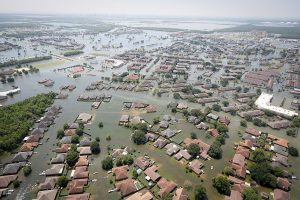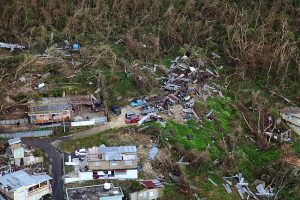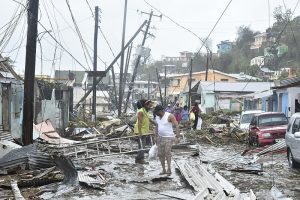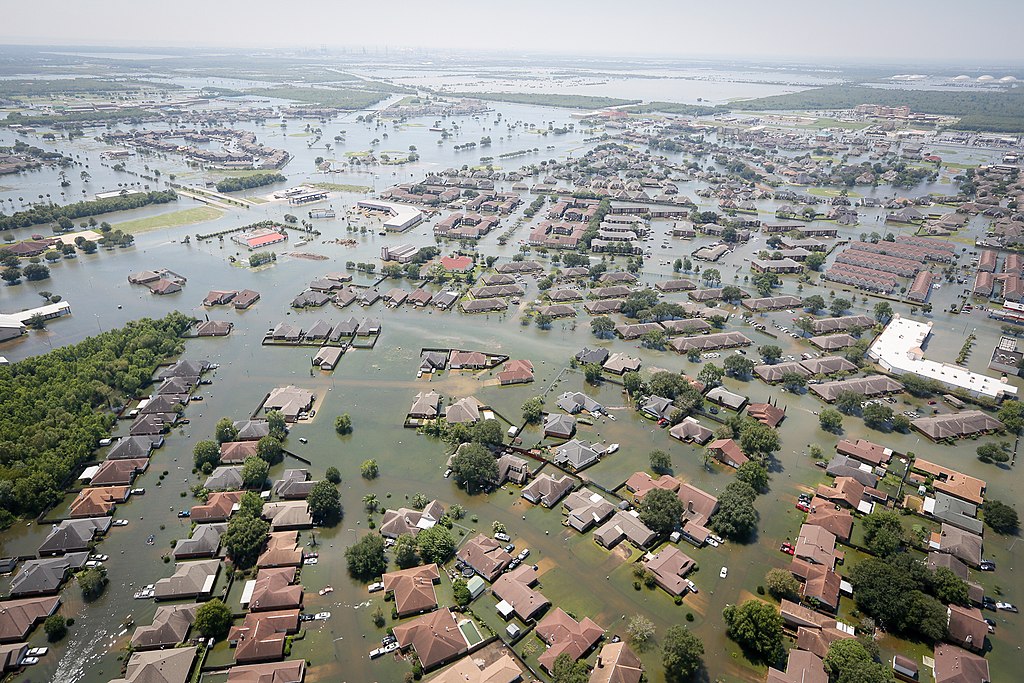This sermon was delivered on Rosh Hashana, at Temple Beth El in Bradenton, Florida
What an incredible season this is. It never seems to end, with disaster after disaster. What is going on?
Hurricane Ian. Parts of Southwest Florida lie devastated. Many have lost their homes.Some lost their lives. Life may never be the same. Some places such as Sanibel Island now hardly exist at all. And lest i neglect to mention, Puerto Rico was hit very hard. Much of the island still is without electricity.

So much suffering. For millions, yes millions, it will be a long time before things return to normal; for others….perhaps never.
By some quirk of nature, Manatee and Sarasota counties here in Florida were spared the full impact of this Hurricane Ian. Of course, we are thankful and yet it doesn’t feel right for us to be celebrating our good luck while so many others are in distress.
There is a particular prayer that comes to mind. It is called the Unetaneh Tokef. It is read on the High Holy Days. Although it goes back to the 11th century, this prayer seems as if it could have been composed with this year in mind.
“On Rosh Hashanah it is written and on Yom Kippur it is sealed:
How many shall pass on, how many shall come to be:
who shall live and who shall die,
who shall see ripe age and who shall not,
Who by fire and who by water?
Who by earthquake and who by drowning?”
And yet, repentance, prayer and righteous acts may avert the evil decree.”
I have mixed feelings about this prayer. Perhaps you have similar misgivings. It definitely scares the “you know what” out of us – the list of all the horrible things that could happen to us, particularly since several of these tragedies indeed have been happening one on top of the other.
It almost feels as if God is teaching us a lesson, as if to say: “Now that I have your attention…”
There is no explanation, but it does make us wonder: does God actually decide who will live and who will die, who will suffer hurricanes, floods and earthquakes and who will be spared? And on what basis would God make such decisions? And do we really believe, as the prayer seems to suggest, that if we repent, pray and do righteous deeds that we just might change God’s mind?
It certainly doesn’t seem that this is true. Particularly considering the great tragedy that befell our people in the dark days of the Holocaust, there is very little evidence that prayers, no matter how fervent, can change the course of events, whether natural of man-made.
Nevertheless, we recite this prayer every year.
Insurance policies often refer to natural disasters as “Acts of God.” Are these hurricanes really acts of of God? Or the earthquakes in Mexico: are these acts of God too? Definitely, in the grander scope of things, as part of the natural order that we believe God created, we can say i that they are acts of God, but not as if to suggest that on such and such a day, God decides: “I think I will create a hurricane.” At least I hope not!
There is a well-known expression. “There but for the grace of God, go I. ”
Maybe you have been feeling it yourself – that tremendous sense relief that Hurricane Irma passed by and mysteriously, here we are, unharmed. Did this happen for a reason?
“There but for the grace of God” may be only a figure of speech, but it does kind of feel that way. Therefore its implications are worth considering.

I want to share some thoughts.
First of all, you should know that “There for the grace of God, go I” is based on an event in the Book of First Corinthians, in the New Testament – not that this alone makes it objectionable to Jews. But it does express a sentiment to which Judaism takes exception.
“There but for the grace of God, go I” stands in contrast to virtually everything that Judaism teaches.
We dare not even entertain the possibility that these these hurricanes and earthquakes, the hits and the misses, are willful acts of God, as in the Biblical legends of the great flood in the Noah story, or the tragic fate that befell Sodom and Gemorrah? These are legends, not history, and should not be regarded literally.
Most important of all we must not permit ourselves to think, even for a moment, that we are deserving of God’s grace whereas the thousands of hapless victims of the hurricanes and earthquakes did anything to incur God’s anger? Still, this well-known phrase raises these unavoidable erroneous conclusions.
I have a pet peeve to share with you – just a little one, but it points to something much more serious.
There is a certain commercial that was on television for years. I would cringe every time I saw it. It was for a certain brand of hair coloring, apparently a fairly expensive one. The beautiful model with her picture perfect hair and gleeming smile says something like: “Yes, it is expensive but I’m worth it. I deserve it.”
No, she does not deserve it. And in a much more serious vein, none of us should believe that we deserve our homes, our cars, our clothes, our plentiful food, our good health, our good fortune or, for that matter, that we somehow deserve having dodged the hurricane.
Ok, I’ll say it…In our lives, we enjoy a lot of mazel, just plain luck for no apparent reason, and most definitely not because of any of our own superior qualities.
There is not a single blessing that we actually deserve, any more than those who spend their lifetimes in abject poverty, or those who have just lost virtually everything in these horrible disasters are deserving of the misery that has befallen them.
They do not deserve their misfortune any more than we deserve our blessings.
In the most widely read Jewish book our times, “When Bad Things Happen to Good People,” Rabbi Harold Kushner expresses the Jewish response to calamity and tragedy. Incidentally, the title is not “Why bad things happen to good people;” it is “When Bad Things Happen…” We don’t pretend to understand the “Why” or even if there is a “Why.”
But there is a “When.”
When ordinary people, such as ourselves, see calamity unfolding before our very eyes, that is when our conscience compels us to step up to the plate: to offer support as best we can.
The instinct of compassion, rachmanus as it is called in Yiddish, is present in just about every human soul, not that it always comes to the fore. Yes, that are those who may express: “There but for the grace of God, go I,” but never lift a finger for those who haven’t been so lucky.

Yes, there are some who say that they feel so sorry for those who are suffering, but who essentially sit on their hands and do nothing. I guess it could be said that the head shakers care….they just don’t care enough.
A small story from only a few days ago. I was at the supermarket checkout counter. The person in front of me had piled all of her purchases on the conveyor belt and the checker was scanning the items. I think the bill came to around $100. At the end, the checker asked if she would like to make a small donation for hurricane relief, to which she shrugged and said: ‘No, thanks.”
I don’t want to exaggerate but the denial of this simple request really got to me. What difference could a few bucks have possibly meant? On the other hand, if she had contributed anything at all, it would have helped and she could have left knowing that she had, at least, done something, and also would have felt better about herself. At least I believe she would have. But she took a pass. I would like to believe that most people are not like that. I hope not.
All of us who are feeling fortunate to have been spared from disaster need to recognize that there is an unmistakeable message here. As Judaism describes is, it is to perform a mitzvah. A mitzvah is not just a good deed, but our religious obligation to lend a hand. We call these chasadim tovim, acts of loving kindness. Mitzvot are what what those who have been fortunate need to do when the chips are down.
The prophet Micah put it so perfectly: “What does God expect of us? To do justly, to love mercy and to walk humbly.”
When disasters strike, we often will hear various public officials offer platitudes such as: “Our hearts go out to them” or “Our prayers are with those who are in distress.” Ugh.
Let me provide a perspective on the function of prayer in the Jewish religion. Even in the darkest of times, prayer was never intended to persuade God to bestow benefits on those who pray. Prayer is essentially a call to human action. Nearly a century ago, in incredibly blunt language, Rabbi Emil G. Hirsch made it abundantly clear what prayer is and what it is not.
“We have never entertained the notion that because we [may] mumble a phrase or two, our faith and our fortune will be changed, that the Power …from which all life flows, that this Power will yield to our wishes, that God will concede to our whims… We always have [understood] that the world is under the rule of law; law that takes no cognizance of [our] needs [or our] whims… And so it is we know that though we may pray for wealth or success, our prayers will not bring to us what we have asked for… The Jew’s idea of prayer was different from the very beginning.
We do not look upon prayer or singing hymns as a gift to God. We do not believe…that by prayer we can keep disease [or calamity away from] our house, by singing hymns we will be fortified in physical robustness.”
So, does praying do any good? I suppose that depends upon each of us. My answer to the question is based on the principle of verifiable results. If we recite a sh’hechiyanu, or spend a few hours in temple at the High Holy Days, the question is not “Did it do any good?” but rather, “So… what happens now? Or as Hillel put it: “If not now, when?” And if nothing happens then I would have to say that these prayers will have been no more than lip service, the annual “nod to God.”
And P.S.: We should stop asking God for stuff.
We should only ask God for that which we have at least some means to participate ourselves. You may not know this, but Jewish law actually forbids us to pray for miracles. One prays, not for God’s Grace, if you will, but rather for inspiration and guidance.
In Judaism, the purpose of praying is to shift our focus from our wish list to our gratitude list, and then to translate these feelings into concrete action.
It seems to me that we, who are blessed with so much, especially these days having just dodged not just the bullet but the cannon, we should not be asking God for anything. Nor should we be thanking God for having spared us, as if we have earned it. For no particular merit of our own. we were spared. I am sure that God does not love Bradenton and Sarasota any more than God loves Puerto Rico or Sanibel Island.
The only meaning that we should ascribe to our incredible mazel is of being called to be of service.
So we return full circle to the U’netaneh tokef prayer that concludes with these words:
“But repentance and prayer and righteous acts avert the evil of the decree.”
The compassion of the many has the power not to prevent, but to alleviate the depth of suffering. And this prescription is what makes prayer both valid and timeless.
In this season of devastating natural disasters, we should just be grateful that we have running water and electricity, that we have a roof over our heads, plenty of food in our cupboards and refrigerators, that we have clothes, and medical care, and all the other comforts of life that, at most, we were without for a few uncomfortable days.
But we also need to understand that appreciation without reciprocation is vacuous. God’s Grace is not what God does for us; it is what we need to do when the chips are down.
Rarely has this realization been more evident than it is right now, in the wake of all that has transpired.
Let us take this message to heart: “L’shanah tovah tikateivu.”
May each of us realize just how very fortuate we are and what God now expects of us: “to do justly, to love mercy, and to walk with humility.”
